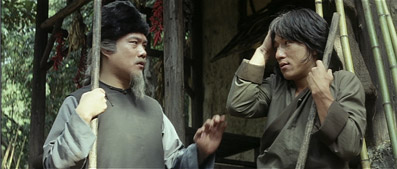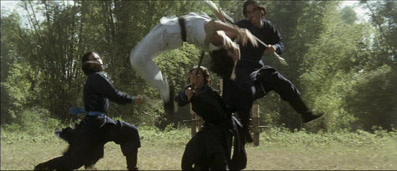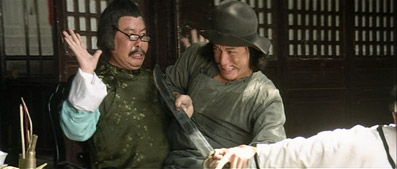|
Jackie
Chan is one of the very few stars of martial arts cinema
whose name is known far beyond the confines of the genre.
This can be put down primarily to the films he made in
Hollywood, comedy actioners in which he is always teamed
up with an English-speaking actor who is more widely known in the
West, the studios convinced that they would never get a
mainstream audience into the cinema if the lead character
was Chinese rather than recognisably American or, at a pinch, English.
Thus Chan has got to play the funny acrobatic Asian guy
next to Chris Rock (Rush Hour),
Owen Wilson (Shanghai Noon), Jennifer Love
Hewitt (The Tuxedo), and British comedians
Lee Evans (The Medallion) and Steve Coogan
(Around the World in 80 Days). If these
are the films you know Chan for, then you've been stiffed. The safety restrictions
of American studio productions have repeatedly put shackles
on Chan's sometimes terrifying stunt work, and no-one in
Hollywood seems to have a clue how to direct an even half-decent
martial arts sequence (and yes, I am including the Wachowskis
and Tarantino in that sweeping condemnation).
Any
true fan of Chan's films will always point a newcomer to
his earlier Hong Kong work, usually to Police Story
and the films that succeeded it, but the more dedicated
devotees will steer you even further back to his period
martial arts films, those that can now be seen as shaping
what became recognised as Chan's distinctive style, where furiously
choreographed martial arts and acrobatics were blended with
knockabout comedy. You'll know you're talking to a real
Jackie Chan fan when the first films they suggest you see
are Snake in the Eagle's Shadow and Drunken
Master.

The
Fearless Hyena, made just a year later, rarely
gets a mention. This is, in retrospect, a little surprising, as
this was Chan's first director credit, and he also
wrote it, starred in it and choreographed all the fights. On its
original Hong Kong release it did phenomenal business,
out-performing both Snake in the Eagle's Shadow
and Drunken Master by a considerable margin.
And yet it's hardly known in the West, previously only seen
at specialist cinemas or on grubby, pan-and-scan video tapes.
I'll admit that I didn't know it until the press release
arrived. I grew up on 70s kung-fu, but wandered from the
path a little once I got out into the world of work, rediscovering
the pleasures of the genre only several years later, since when
I've been back-tracking my way through any number of fine
films that I missed the first time around.
There
are a good many genre fans, myself included, who still have
a special affection for the so-called old-school martial
arts films, those where the thrill of the action was down
to the skills of the fight choreographer and the performers
rather than the editor and wire-work operators. Seeing
an old school kung-fu film is akin to watching a ballet
– you don't go to a performance of Swan Lake to
immerse yourself in the story, you're there to listen to the music and
to watch the dancers do their stuff. Fearless Hyena, like
so many kung-fu films of the period, has a rice-paper thin
plot that is utterly formulaic. But oh man, the dancing...
Chan
stars as Shing Lung, the bumbling grandson of kung-fu master
Chen Peng-fei. Although he has learned well from his grandfather,
Shing does not take his training seriously enough, gambling
behind the old man's back and openly using fighting abilities
that he has promised to keep secret. A gambling win and
a fight in the woods land him a job as an instructor for
a local martial arts school whose owner can't fight for
toffee. But trouble is on the way in the shape of General
Yen and his three armed goons, who are looking for Grandfather Chen
with the intention of killing him. They don't know about
his grandson, at least not yet.

It's common knowledge that in martial arts films, the prime function of the narrative is to provide motivation for the
fight sequences and a bridge between them. I know I've said that before about but
I don't think it's ever been truer than it is here. Frankly, you're
lucky there's any plot at all, so brief are the pauses between the action scenes, which initially alternate between training
sequences and comical combat, with the shift towards more serious
encounters occuring two-thirds of the way in. And they're
all superb, a steady stream of brilliantly choreographed
and blisteringly performed examples of Chan the martial
artist, Chan the acrobat and Chan the physical comedian
at the top of his game.
The
memorable moments are almost too numerous to mention, but
particular favourites involve Chan balancing on pottery,
a fight for food using chopsticks, a set-to in which benches
are used to assault and humiliate an opponent (in a manner
that prefigures a similar scene in Young Master),
and a battle that sees Chan ducking and diving to escape
a simultaneous three-sword assault. There are no short encounters
here, with almost every fight running for the sort of length
normally reserved for the climactic punch-up, and the energy
expended in any of them would be enough to light and heat
a small town for a week. Crucially, Chan the director also
knows how to best showcase the fights for film, his camera placement
always servicing the action, with medium long shots of battles
running long enough for us to appreciate and enjoy
the work involved in staging them. At a time when such combat is often drowned in a firestorm of machine-gun editing and
waggly camera close-ups, this is particularly refreshing.
On
the commentary track, kung-fu cinema writer Andrew Staton
hopes that this DVD release will allow the film to reach
a larger UK audience and ultimately be held in the same regard
as its more widely seen predecessors. I absolutely share
this view. Fearless Hyena really is a showcase
for Chan the performer at his best – it may lack the scale
and more detailed plotting of his later Hong Kong films,
but for its inventiveness and pace and the consistently
jaw-dropping brilliance of its choreography, it actually
outshines both A Snake in Eagle's Shadow
and Drunken Master and leaves Chan's Hollywood
films coughing in the dust.
Along
with Hand of Death,
this is the first Hong Kong legends release to wear the
'Ultrabit' label, indicating that the picture has been encoded
at the maximum possible bit rate. Intermittent checks throughout
the film confirm this to be the case – the rate wandered
between 9.4 and 10, only momentarily dropping below that.
The results are seriously impressive given the film's vintage
and Hong Kong cinema's poor record of film preservation
(the films were never seen as having any longevity). The
colour, contrast and sharpness are the equal of many more
recent films and a great deal better than many. There is
some edge enhancement at work here, but it is not intrusive.
The source print has been impressively restored and
is almost completely free of dust spots and blemishes.

The
original Cantonese mono 2.0 track is included, plus a Cantonese
5.1 remix and a 5.1 English dub. The film's age shows in
the dynamic range and minor distortion in some sound effects
and dialogue on all three tracks. The Cantonese 5.1 remix throws
ambient sound effects around the room, but introduces a slight hum
that is not present on the mono track or the English dub.
The latter gives Jackie a most inappropriate British public
school accent.
Commentary
As with Hand of Death, the only real feature
of note is tucked away in the Audio Selection menu. The
commentary here is by Andrew Staton and Aenie Hayirilioglu,
both writers for Martial Arts Illustrated and Impact
magazine. I have to admit to being less than enthralled
by Staton's commentary (with Will Johnson) on the Platinum
Edition of The
Big Boss, which had its good points but was
a little on the dreary side. On the basis of the commentary
here I'm prepared to take it all back. Although the pair sometimes
just describe what's taking place on screen, for the most part
this is a consistently interesting and informative track
and is delivered in lively and enthusiastic fashion. They don't know their Chinese history as well as previous
commentary master Bey Logan, but provide plenty of background
information on the film and Jackie Chan's early career,
particularly his working relationship with Lo Wei. A very
worthwhile extra.
The
usual HKL trailer collection is
also here.
If
you really want to see what made Jackie Chan the natural
successor to Bruce Lee then this is a damned fine place
to start. If kung-fu films are not your glass of tea, however,
you'll probably just spend the film complaining about
the lack of original plotting. It's your loss, as evidenced
by Chan's US films, which have more story but are nowhere
near as much fun. As for martial arts cinema fans
– consider this an essential purchase.
|